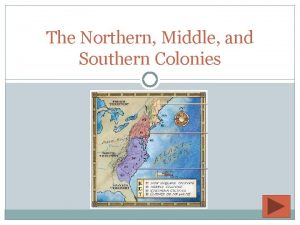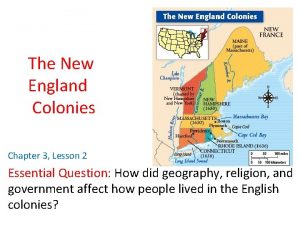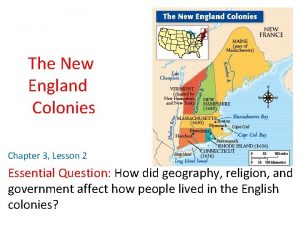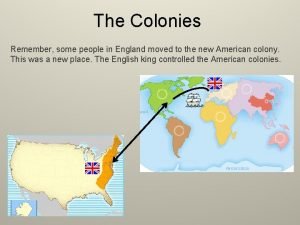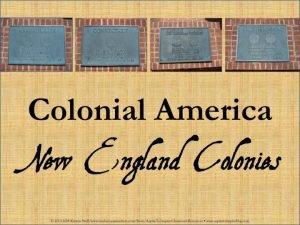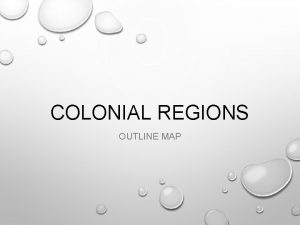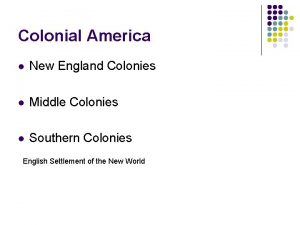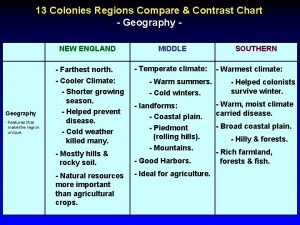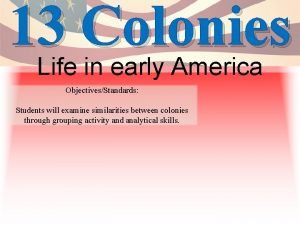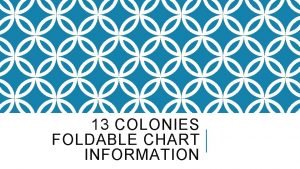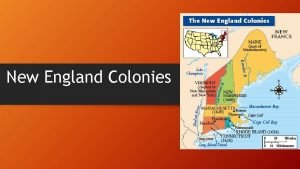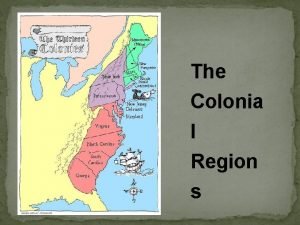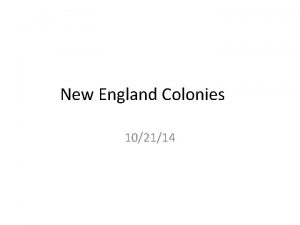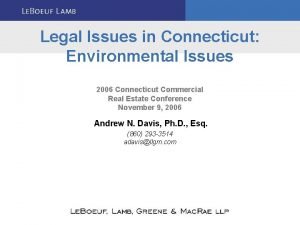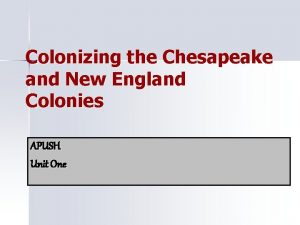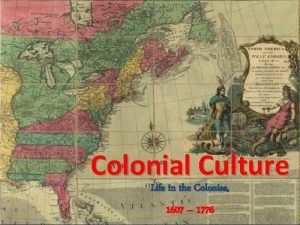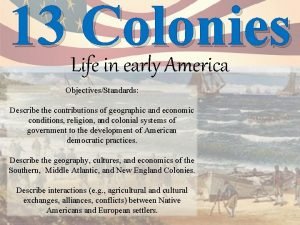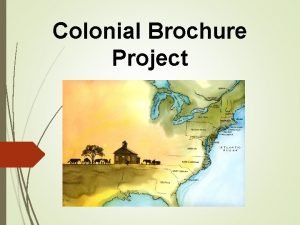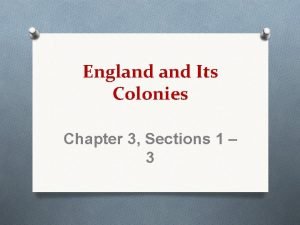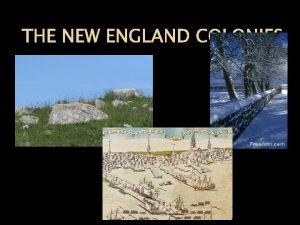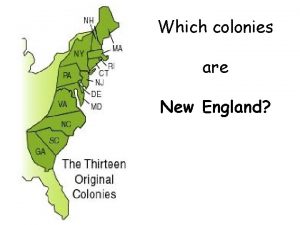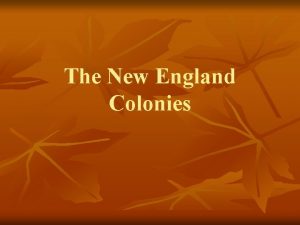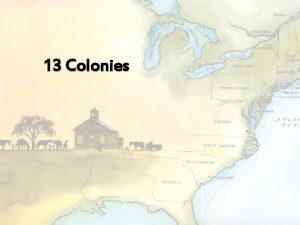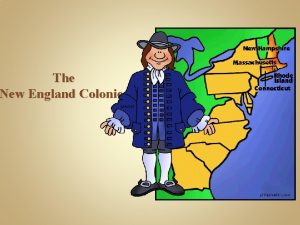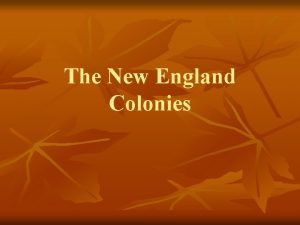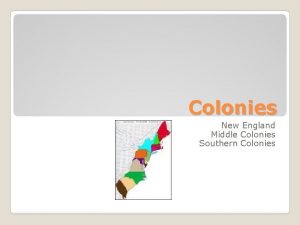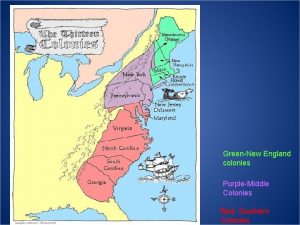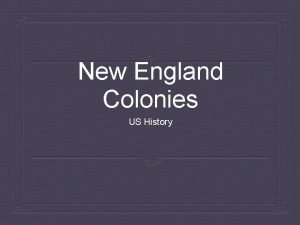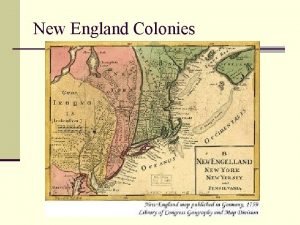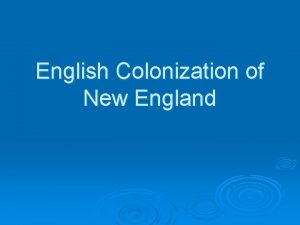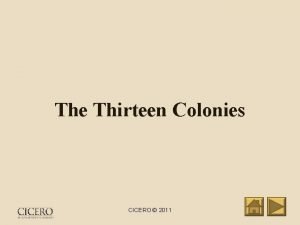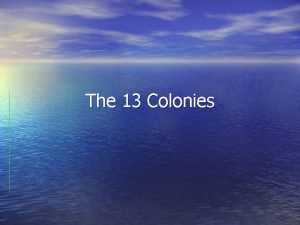New England Colonies AP US History Rise of
























- Slides: 24

New England Colonies AP US History

Rise of Puritanism Protestant sect Influenced by John Calvin (Calvinism)

Rise of Puritanism 1530 s: Henry VIII broke ties with Catholic Church, created Church of England (Anglican) Puritans became those seeking reform of Church of England

Pilgrims First wave of Separatists Left for Holland, led by Rev. John Robinson Left for New World

Mayflower 1620 102 persons (men, women, children) Less than half were Separatists

Mayflower Compact Not a constitution but an agreement Purpose Provisions

Plymouth had been an Amerindian community that had been ravaged by a great plague just a few years earlier. outside jurisdiction of Virginia Company

Plymouth Despite terrible first winter where over ½ the people died, no one left Plymouth Plantation.

Thanksgiving Autumn, 1621 Alliance formed by Pilgrims & Wampanoags (why? )

Success of the Pilgrims Economic Religious William Bradford Miles Standish

1691, the small Plymouth colony of 7, 000 people merged with the large Massachusetts Bay Colony.

Mass Bay Colony founded in 1629 by non-Separatist Puritans out of fear for their faith and England's future. Cambridge Agreement

Great Migration (1630 s)

John Winthrop Governor, MBC Covenant Theology "We shall build a city upon a hill" in A Model of Christian Charity

Economics Massachusetts became biggest and most influential of New England colonies. Economy: fishing, shipbuilding, fur trade, lumbering; some dairy farming, and small farming of wheat & corn

Religion & Politics in MBC Governing open to all free adult males belonging to Puritan congregations (2/5 of population) Emergence of direct democracy

Religion & Politics in MBC Purpose of government: enforce God's laws (covenant theology) Provincial gov't under Governor Winthrop was not a democracy Only Puritans -- the "visible saints" -- could be freemen only freemen could vote Hated democracy and distrusted non-Puritan common people. Congregational church was "established": Non-church members as well as believers required to pay taxes to the gov't-supported church. Religious dissenters were punished New England became the least tolerant regarding religion

Church Leadership Influenced admission to church membership by conducting public interrogations of people claiming to have experienced conversion.

Church Leadership Clergymen were not allowed to hold political office Congregation could hire and fire ministers and set salaries. In effect, a form of separation of church and state.

Cambridge Platform (1648) 4 Puritan colonies--MBC, Plymouth, Connecticut & New Haven -- organized a congregational form of church gov’t Significance?

From direct to indirect democracy Representative legislative assembly formed in 1634 and after 1642 assembly met separately as a lower house and was most influential part of gov’t.

Religious Dissenters in MBC 1. Quakers 2. Anne Hutchinson – Antinomianism

Religious Dissenters in MBC 3. Roger Williams – “liberty of conscience” and “wall of separation”

Decline of Puritanism First generation Puritans began losing their religious zeal as time went on. Large population influx dispersed Puritan population onto outlying farms away from control of church and neighbors. After the wave of dissention in the 1630 s and 1640 s (e. g. Hutchinson and Williams) conversions decreased dramatically. Children of nonconverted members could not be baptized. The jeremiad, taken from the Old Testament prophet Jeremiah, was used by preachers to scold parishioners into being more committed to their faith. Conversions continued to decrease as 2 nd generation Puritans had trouble getting their conversions authenticated by the church, thus preventing their children from being baptized.
 When was the new england colonies founded
When was the new england colonies founded Guided reading lesson 2 the new england colonies
Guided reading lesson 2 the new england colonies Chapter 3 lesson 2 the new england colonies
Chapter 3 lesson 2 the new england colonies Site:slidetodoc.com
Site:slidetodoc.com New england colonies leaders
New england colonies leaders Blank map of new england colonies
Blank map of new england colonies L
L New england colonies facts
New england colonies facts New england colonies leaders
New england colonies leaders Comparing colonial regions
Comparing colonial regions Middle colonies economy
Middle colonies economy 13 colonies foldable
13 colonies foldable Rocky soil in new england colonies
Rocky soil in new england colonies Middle colonies terrain
Middle colonies terrain New england colonies climate
New england colonies climate New england colonies definition
New england colonies definition New england, middle and southern colonies comparison chart
New england, middle and southern colonies comparison chart New england colonies drawings
New england colonies drawings Chesapeake colonies apush
Chesapeake colonies apush New england colonies labor source
New england colonies labor source New england colonies facts
New england colonies facts New england mid atlantic and southern colonies
New england mid atlantic and southern colonies 13 colonies brochure
13 colonies brochure Chapter 3 section 1 england and its colonies
Chapter 3 section 1 england and its colonies Rise and rise until lambs become lions
Rise and rise until lambs become lions
